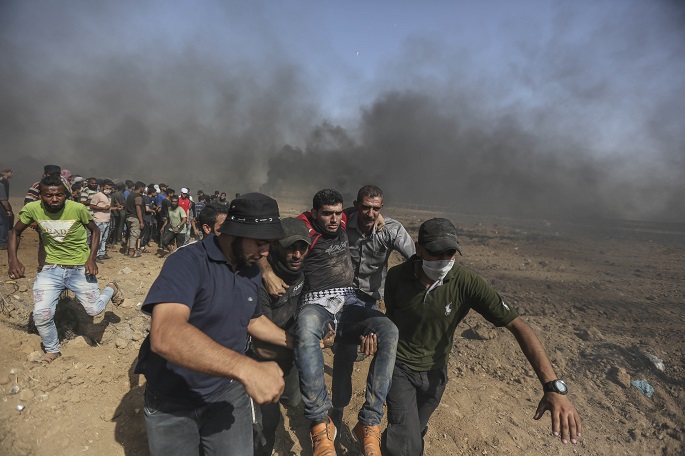Palestinian-Israeli military conflict looms in Gaza despite int'l efforts to mediate cease-fire
Published : 29 Jul 2018, 02:13
An open military confrontation between the Palestinians in the Gaza Strip and Israelis is looming amid regional and international efforts to reach a long-term settlement agreement and avoid bloody conflict.
Over the past few weeks, Israel carried out multiple airstrikes and artillery attacks on the Gaza Strip, killing and injuring dozens of Palestinians, while Palestinian factions fired barrages of rockets into southern Israel.
On Wednesday, three militants belonging to Islamic Hamas movement, which rules the Gaza Strip, were killed in an Israeli bombardment along Gaza-Israel borders.
Israel said the shelling came in response to an earlier fire from Gaza at an Israeli army force stationed at the border fence, where an Israeli soldier was injured.
On Thursday, Hamas's military wing, al-Qassam Brigades, announced that it is on high alert, urging all armed factions in Gaza to be at the highest readiness level for any possible developments.
Last Friday, four Palestinians, including three Hamas militants, and an Israeli soldier were also killed in one of the most violent rounds of tension between the two sides since Israel's recent war on the Gaza Strip in the summer of 2014.
These developments have pushed Egypt, Qatar and the United Nations to exert intense efforts to restore calm in the Israeli-blockaded territory.
"The field developments in Gaza show that we are facing a state of intermittent rounds of escalation and continued tension," Gaza-based political expert Adnan Abu Amer told Xinhua.
Abu Amer said he believes that both sides are not interested in an open field confrontation because it will be too expensive for them.
However, the expert said, this situation of repetition of limited confrontations may lead them to a decisive stage that will in the end require either a strong truce deal or a large-scale military action.
Tension in Gaza has been high since the Palestinians launched the ongoing "Great March of Return" on March 30, which demands the lift of the blockade Israel has imposed on Gaza since 2007.
About 148 Palestinians have been killed by Israeli gunfire during the rallies which peak every Friday.
To avoid collapse of an already shaky truce in Gaza, there has been widespread talk of international and regional efforts to mediate an agreement between Israel and Hamas to reach a strong cease-fire deal.
According to media reports, the agreement is supposed to include humanitarian facilities from Israel to improve the dire situation in the Gaza Strip, especially in the economic field, in return for the establishment of the cease-fire agreement for several years.
However, the recent developments in Gaza have ensured that Israel has tightened its blockade on the coastal enclave after imposing additional restrictions on the entry of goods, particularly raw and construction materials, which threatens an unprecedented escalation of the humanitarian crisis.
The Israeli decision came in response to the Palestinian arson kites and helium balloons flying from Gaza into Israel, which caused large fire and losses in the Israeli territory.
Hamza Abu Shanab, another political observer and writer from Gaza, believes that the field behavior of both sides has become the main determinant in escalating or decreasing tension.
He pointed out that both sides do not have political goals for a new war, stressing that Israel is more occupied with the growing threats on the northern front with Syria where it is attempting to impose a different reality on the Golan front.
Gaza has been placed under a tight Israeli blockade since Islamic Hamas movement seized the territory after routing forces loyal to President Mahmoud Abbas in 2007.
The blockade has pushed Gaza's two million people deeper into poverty with unprecedented unemployment rates.
In the recent nine years, Israel and Hamas movement have been engaged in three major wars that claimed the lives of thousands of Palestinians and Israelis.


